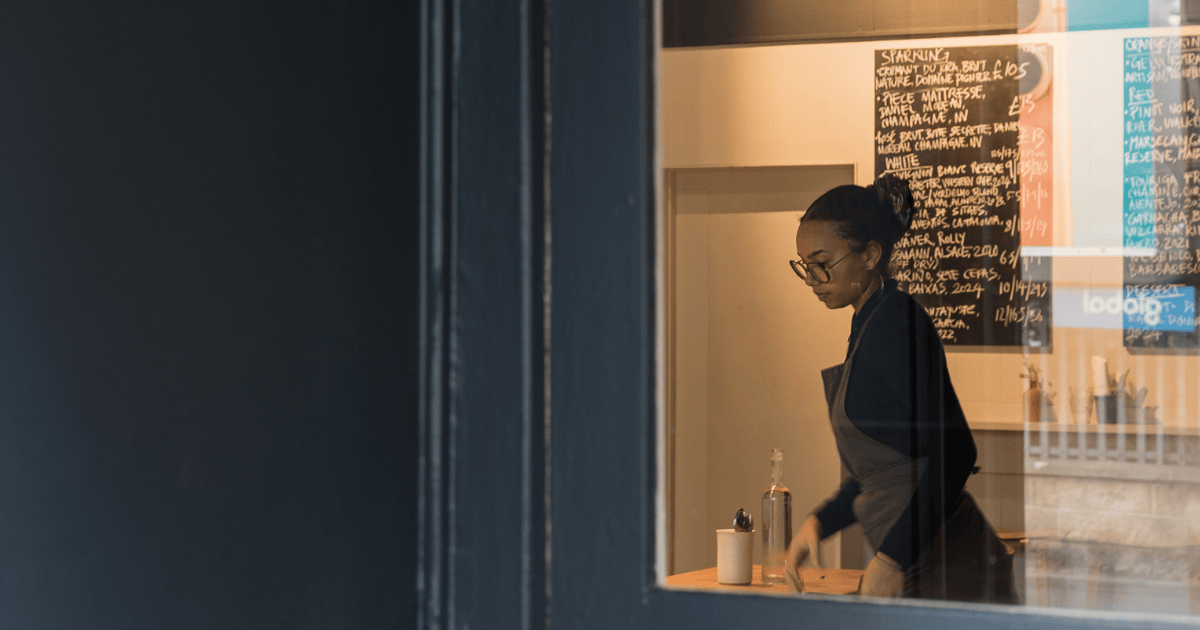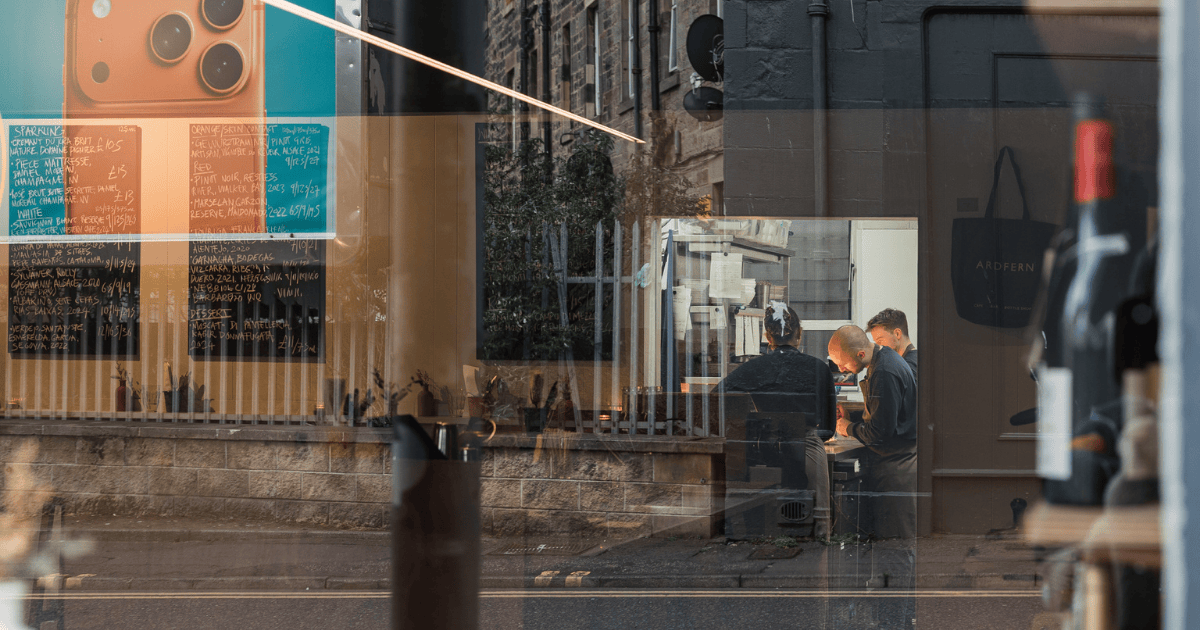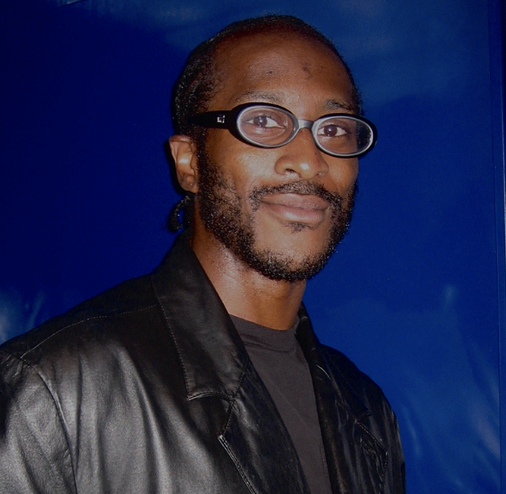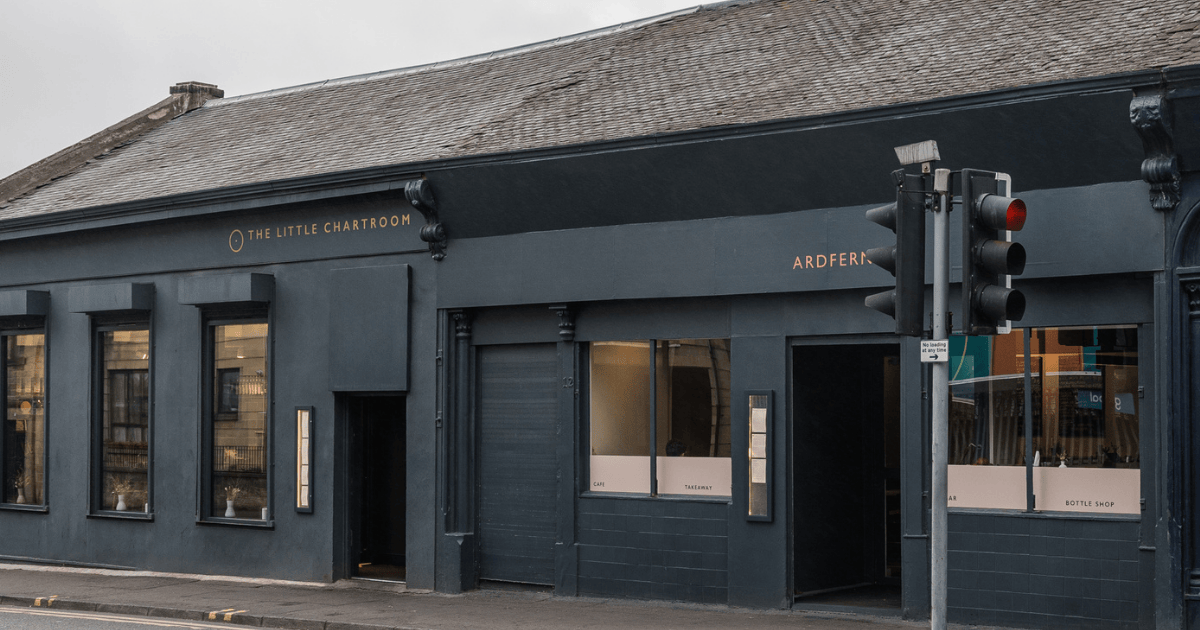After a year, Ardfern has found its feet. But Roberta Hall-McCarron isnŌĆÖt done yet. The interview: why Ardfern Chef-Owner Roberta Hall-McCarron has high hopes for EdinburghŌĆÖs restaurants.
ŌĆŹŌĆśEdinburgh is a city thatŌĆÖs always had a really good food culture.ŌĆÖ
As a chef, Roberta Hall-McCarron needs no introduction. Having opened The Little Chartroom, her seminal debut restaurant, in Leith back in 2018, sheŌĆÖs since become one of ScotlandŌĆÖs most recognised culinary figures and one of the nationŌĆÖs elite talents that have propelled the nation into the culinary spotlight.┬Ā
Along with highlighting a modern approach to cooking and seasonality, the chefŌĆÖs restaurants (now including the relaxed wine bar and all-day cafe Ardfern and the contemporary bistro Eleanore, on the original site of the now-relocated Chartroom) continue to raise the bar for what a contemporary restaurant in the capital can be, from her front of house teamsŌĆÖ friendly, intuitive style of service, to her chefsŌĆÖ increasing use of whole animal butchery to minimise waste and maximise value and flavour.

When we catch up with her, sheŌĆÖs taking a moment to catch her breath before the start of service at Ardfern, which opened in June 2024 and sits next door to The Little Chartroom on Bonnington Road.
As restaurants go, Ardfern has been a welcome change of pace for Hall-McCarron, a sailing enthusiast who named it after Ardfern Marina in Argyll, she frequented as a child. While the laid-back caf├®, wine bar and bottle shop might feel outwardly like a departure from the relative formality and precision of The Little Chartroom and Eleanore, in ethos, it still retains its siblingsŌĆÖ DNA via the chefŌĆÖs grounding in the seasonal bounty of ScotlandŌĆÖs own larder and a considered approach to everything from a plate of hash browns or fritters to an evening menu of small plates that the restaurant has become known for.┬Ā
Conversely, while itŌĆÖs billed as a caf├®, the kitchenŌĆÖs thoughtful approach is capable of elevating workaday dishes like kedgeree or the humble breakfast roll. ItŌĆÖs an approach thatŌĆÖs won over a spectrum of guests, from locals who might drop by for a snack or a glass of wine or a full-blown Sunday roast, to national critics who have swooned over the restaurantŌĆÖs ability to nail simple dishes with poise and flair ŌĆō but more on that later.┬Ā
We chatted with Hall-McCarron about how the restaurant has fared over the course of the past year, the challenges of operating a restaurant in Edinburgh in the current economic climate, and how that Jay Rayner review for The Observer came about.
YouŌĆÖve been open just over a year now. How are things coming together?
Whenever a new season starts, that's always exciting, and so all the food's changing, and that always puts fire in everyone again.
There will be a shift in the menu with regards to that. Not that it will be necessarily heavier ŌĆō I think the food at Ardfern generally is pretty comforting ŌĆō but I think there is a comfort to the food that will very much continue with autumn. And weŌĆÖre only a year in ŌĆō we opened up in June 2024. So we're still a very, very young business. I think we're very much in a flow now with how the format is and how we're perceived, and what really works, and what we have.┬Ā
This is our second autumn. WeŌĆÖre in the height of game season as well, and we use a lot of the game in The Chartroom. And being next door to each other, there'll be lots of different game elements going on through the menu [at Ardfern] as well.┬Ā
We're also now into the stone fruit era. There'll be bits and bobs of that, and then, gosh, all the root vegetables and pumpkin as well. So, things will richen up a little bit and get a wee bit heavier.
In practical terms, what can your guests expect on the menu?
ŌĆŹWith the actual format of the menu, we always have our snack section at the top. There's always a hash brown, but the topping changes. ThereŌĆÖs always something that's cold, and it will rotate between being veggie, fish or meat, and there's always three smaller snacky bites.┬Ā
If something comes into season, it's like, ŌĆśOh, youŌĆÖll want to put this on.ŌĆÖ So, we'll put it on as a special, and we'll add it to the menu ever so slightly ŌĆō but we try not to get it to go beyond the format that we do have, as we've figured out that it just doesn't quite work.
And then you've got your slightly bigger dishes, but there's only a few dishes that are really big plates ŌĆō like the full breakfast and the Sunday roast. And I'd say that the Sunday roast is probably the thing that when we first started doing it ŌĆō God, my memoryŌĆÖs going to fail me now ŌĆō┬Ā we either did it straight off the bat, or we did it very, very soon after we opened, because we wanted to get the message across of who we are, and this is what we're doing on this day. And so we did do it.┬Ā
How did the wine dinners come about?
We do lots of wine dinners, and there's obviously a massive wine focus, and it's wonderful getting all these different producers over from all parts of the world.┬Ā
I think we've done more than 20 ŌĆö maybe closer to 25. And they're the one of the things that, you know when we put it out, because we sell it like a ticket, it sells out really quickly because people are interested in learning about wine.┬Ā
We get some really interesting producers in. But then we're also pairing it with a bit of food. It's always reasonably priced so it's been such a success. And we did that early on as well. I think we were one month in from opening and we did our first wine dinner and we average about one a month. But I think we did five in June, which was a bit nuts. But they're being so well received. ItŌĆÖs just another little nice thing to be able to do, and it suits the space really well.┬Ā
What was the story behind the Jay Rayner review?
For our team, if someone starts at seven o'clock in the morning, theyŌĆÖll order something from the kitchen, and I guess, itŌĆÖs our staff meal for them, because it's such an early start. And so they were having these filled rolls. And I was like, ŌĆśWe need to get this on the menu.ŌĆÖ Who doesn't love a filled roll?┬Ā
And I honestly can't remember how long we'd had that on for, but then Jay Rayner came in and ordered the filled roll. You know, one of the most basic things ŌĆō but it's not basic, because we make every single part of it except the roll. And he absolutely waxed lyrical about it. IŌĆÖve opened three restaurants over the last seven years. I think it's the best review that we've ever had.┬Ā
Because it was that beautiful thing of homing in on something that was a really, really simple thing, but saying, ŌĆśYou know what? These guys nailed it.ŌĆÖ And that was quite a special moment, and it was nice because he kind of just really captured what Ardfern is, and that was what made that review so, so extra special as well.┬Ā
For you, what makes Edinburgh a special place for people who love to eat and drink and just love hospitality?
I think Edinburgh has always been a city that's had a good food culture, but I think in the last 10 years, it's really grown. And I think the variety of what you can get has grown. When we opened up the Chartroom seven years ago, we wanted to open up a neighbourhood bistro ŌĆō somewhere that you could go once a week if you wanted to. It was just that relaxed thing but it was still everything that we wanted it to be.┬Ā
And I think there was a bit of a lack of that middle end restaurant. You had your very casual places, and then you had more high-end restaurants. And I'd say, now, that's very much changed.┬Ā
The more places that open up doing great things, it attracts more people from outside. And Edinburgh is a stunning city, so it's always going to attract people. Sometimes you can very much take it for granted. It's not until you kind of go away and come back that you realise just how special a city it is. And you can walk from a lot of the places, and it's better connected now. The bus system's always been really good, but now that the trams are up and running and they've been extended, they're really connecting the city a lot more than they used to. So I think all these little things have grown the food culture.

Where do you think businesses need the most support? And how have you and your team navigated those challenges?
We've had to do quite a lot. We've recently just reduced down our opening days in The Little Chartroom. So we were seven days, and we've gone down to five days.┬Ā
And one thing that we're doing a little bit is going direct to suppliers, and we're saving money there by just cutting out that middleman. It's interesting. And it works for us at the Chartroom and at Ardfern, because we've got the storage so we're able to do it.┬Ā
We've always done a lot of whole butchery and utilising every aspect of whatever animalŌĆÖs coming in between the two places. That's working very well, and it's great for the team. It's such a positive thing. And so not only do we save money, we're training and teaching more. And it's really satisfying. It's like that thing of going back to all your suppliers and being like, right, where can we cut down a tiny bit? Or where can we tighten the screw here? And it's just being a bit more aware and ŌĆō not that we werenŌĆÖt before ŌĆō really being on top of everything,┬Ā
And I think looking at: is the offering good? Is it exactly what the guests are wanting? Are there any little things that we could do that might just drive a little bit more business on special nights, things that could be themed in some sort of way?
Because it is hard. I think this is almost like a harder time than the pandemic. The pandemic was hard, but we were a very different business then. I think if we'd had this business back then, then it would have been way harder,┬Ā
I think it feels more difficult because before we had quite a lot of support from the government. Now, I almost feel like they're going against us ŌĆō just everything they're doing, it's like, do you want any businesses to survive? What do they want this country to be in five yearsŌĆÖ time? There's so little support.┬Ā
And whenever you think, okay, great ŌĆō we've had a great week. Then youŌĆÖve got to pay everything. We're not in dire straits at all, but we work hard, and we just don't feel like we're getting any rewards.┬Ā

ŌĆŹ
You've always used your platform to encourage more women to take leadership positions or start businesses within the industry. Since you began that journey, have you noticed any positive change?
ŌĆŹŌĆŹI'm definitely seeing more women in higher up positions. That, already, I think, is starting to filter through and impact opportunities. I mean, gosh ŌĆō look at Lorna [McNee], like she's the judge on Great British Menu ŌĆō that's a huge representation of women.┬Ā
But also in Scotland, what she's doing for the industry is incredible. SheŌĆÖs got a restaurant and is on one of the biggest food shows on telly and is sitting as a judge on the panel. And so I think there's more that are quite visual. I think that helps a hell of a lot, talking about it, continuing to talk about it, but also just inspiring.
This time last year, there was one female chef within my entire group, which was heartbreaking. And I was like, why isn't that higher? And now, the male percentage is still higher, but I've got three female chefs at the Chartroom on a team of eight people. WeŌĆÖre not 50:50, but we're a hell of a lot better.┬Ā
And they're young. That's a big change I've seen. It's only been the last year, two years, that suddenly we're getting lots of applicants, but we're also getting young people that are in their teens who are wanting to do it again. And it's very humbling, thank God. We were thinking that we weren't getting anyone through, that everyone had left the industry.┬Ā
But then there seems to be a little bit of a resurgence in regard to people wanting to come into this industry, and the fact that one of my chefs, she's about to turn 18, and this is her first job. She was training to be a plumber but then decided she wanted to become a chef. It's just so important that we do take those people on, because if we don't train them, then what have we got for the future?┬Ā
I honestly think that it comes back to the home, and it comes back to school. There needs to be a massive change in schools with regards to the offering that they're getting, with regards to the education that they're getting with food. Could we incorporate a part of the curriculum that needs to be about learning how to grow food and where it comes from, the origin of it all, and then turning it into something that's healthy and tasty? And giving them that at a very, very young age will just set people up for life, and that's where weŌĆÖre really faltering in this country as well.
What's next for Ardfern? And using your crystal ball, whatŌĆÖs on the horizon for the industry?
For Ardfern, I think it's to continue going from strength to strength, continuing what it is already doing. And if someone's visiting Edinburgh, then it's on their hit list, you know. I want all of my three restaurants on everyone's hit list, because you can come for breakfast, you can come for dinner, you can come for a glass of wine. So really continuing to grow the reputation that it's starting to get and see just what else it can do. I think there is still room for growth with it.┬Ā
What do I see for the industry? I really do hope that we'll continue to see this amazing growth in cities across Scotland and the UK. It does just take one good restaurant to be driving other operators to consider opening up in other cities as well.┬Ā
We actually had a holiday in Fife this year, and we had such a good time. And there was stuff for us to do, weŌĆÖve always had these beautiful coastal villages. But the actual food offering that you're getting out there ŌĆō I was telling a friend who was in Ardfern the other day ŌĆō and he was like, I grew up in Fife. And I wish we had all that it has now, when I was growing up.┬Ā
And I think that it's pretty cool that it has grown so much, and that's only 10, 20 years to get it to the point where you can be like, let's just go to Fife. And it was all very orientated around our daughter, but also it was oriented around us as well. And we had also just gone to Greece. And [RobertaŌĆÖs partner] Shaun was like, ŌĆśI'm trying to work out if I enjoyed the Fife holiday more or the Greece holiday.ŌĆÖ To be able to say something like that shows just how far the industry has come.┬Ā
And so I predict that for the future is the continued growth in all these wonderful little places that are a little bit unknown. I think it's gonna be really, really nice.








